"An engineer trapped in a farmer’s body", is how Dinny Galvin describes himself, with a mixture of wit and insight that is typical of this charismatic Kerry farmer.
And it’s true – Dinny really is helping to engineer a brighter, more sustainable future for his rural community in the Dingle peninsula. He is doing so by building bridges between farmers, organisations, researchers and funders.
This is helping to create pathways via which his community can navigate a way through the sustainability challenges that currently beset them – but may yet benefit them, at least if Dinny has his way.
Dinny took over his own farm in Lispole in 1987, aged 16, following the death of his father Bernard.
He had very little choice but to become the head of the family and support his mother and sisters on the farm, which then held eight cows and 30 sheep, with vegetables and turf for home consumption.
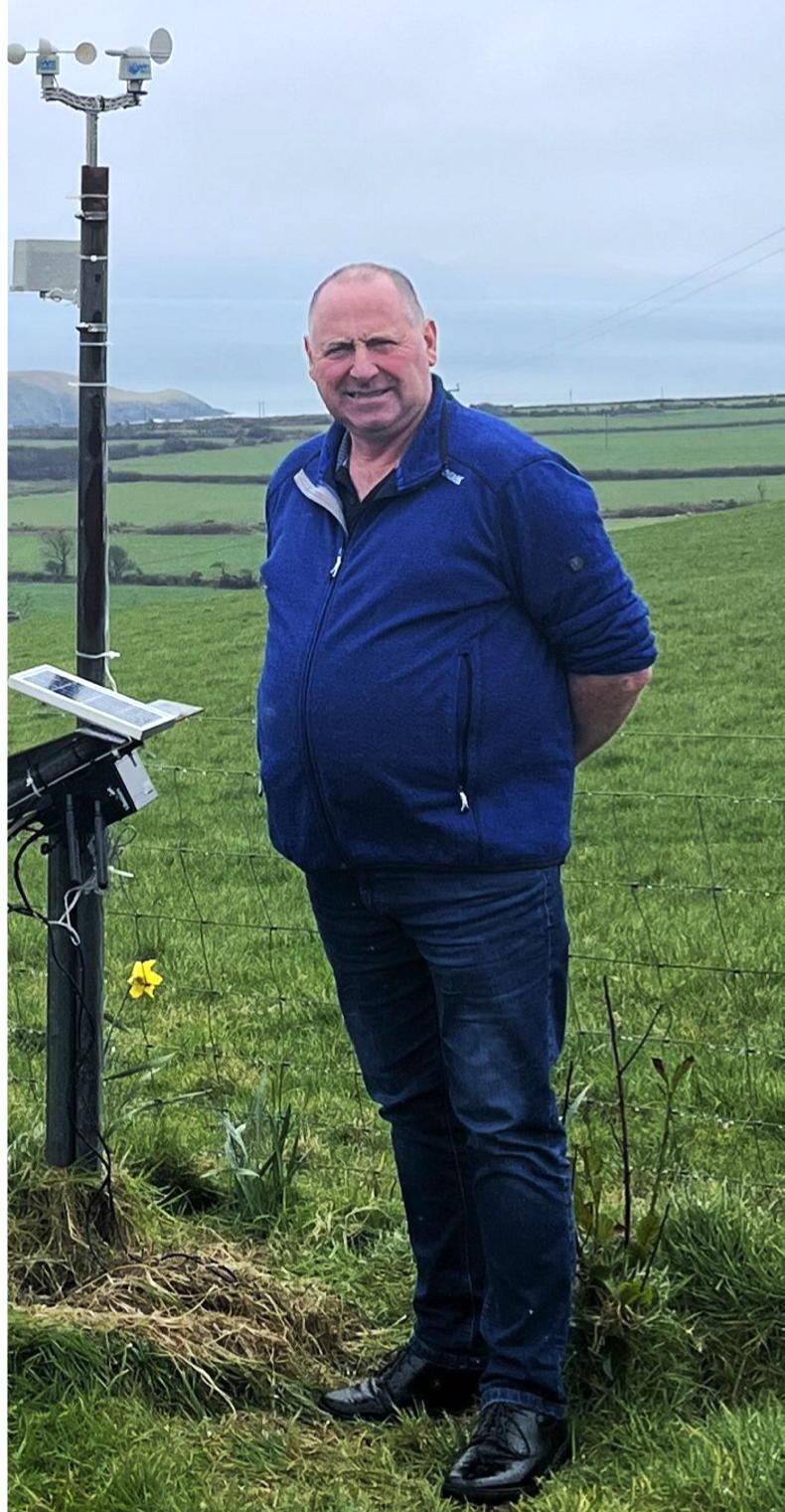
With a passion for farming and engineering, Dinny manages to combine these interests on his own land – seen here at a weather station on his farm.
Hungry to learn, Dinny did his Green Cert in Tralee, which enabled him to avail of the grants and advice needed to develop the farm business.
He set about removing boundaries, “stripping, trenching and burying” areas of lowland peat, reseeding and fertilising.
Working hard, often “with his backside in the sky”, he recalls that there was no mention at all back then of climate or biodiversity.
Struggling to survive
This hard graft, along with an adjacent 63-acre farm, which he later rented, allowed Dinny to grow his dairy herd to 60 cows, and his flock to over 150 sheep.
Married to Nicola, and with five school-going children to rear, this was as much as Dinny could do with the place to support his family, and he did it as well as he possibly could.
Dinny loves farming but, like many other farmers today, he is finding it ever harder to tolerate the toxic combination of rising input costs, increasing regulation, unpredictable weather, volatile prices, and the persistently negative sentiment towards his sector.
While science has helped – using grass measuring and satellite technology has enabled him to reduce his fertiliser costs by 50% – he feels that reducing numbers and working off-farm may be the most realistic way forward for him and whoever comes after him.
Dinny does make the point, however that, for many farmers, the farm animals are like family, and their loss may lead to a crisis of identity and purpose that could take a toll on the health of an already isolated and ageing community.
The inner engineer
But ‘what’s for you won’t go by you’ as they say, and Dinny’s recent farming journey confirms this adage. It all began with an idea he had about generating electricity from a river on the farm – his “inner engineer” was acting up.
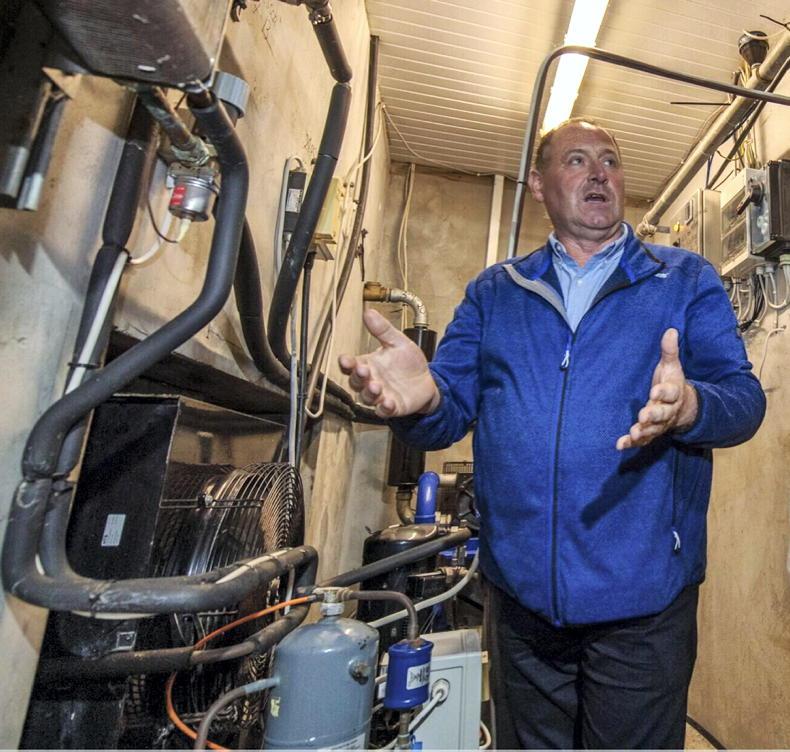
Dinny’s interest in engineering was put to good use on his own farm, where he has tested heat recovery systems, electric vehicles and heat pumps as part of an ESB networks project.
This led him to the local Dingle Hub for some advice. The Hub opened in 2017, originally as a digital hub for remote working, but evolving to become a widely respected powerhouse of innovation, creativity and collaboration for the peninsula.
Today, led by Deirdre de Bhailís with a committed local team, it is supported by organisations like Enterprise Ireland.
Dinny’s visit to the hub was to enmesh him in a web from which he has yet to escape – not that he wants to.
Deirdre invited him to sit on a steering committee to explore the feasibility of an anaerobic digester (AD) for the region. This in turn led to collaboration with ESB Networks, which saw him selected as an ambassador for the ‘Dingle Project’ on sustainable energy use.
Dinny was by now in his element – he was always fascinated with electricity, in spite of getting “many’s the good wallop” from it.
His ambassadorial role meant he could test EVs, heat pumps and retrofitting in his own home and farm, further encouraging and emboldening him – and widening his circle of influence.
Problem-solving
The next step on Dinny’s unplanned new career path was a proposal to the Sustainable Energy Authority of Ireland (SEAI) to develop an energy masterplan for the region’s dairy farmers.
This was initially born out of the frustration that he and his neighbours felt as dairy farmers, who unwittingly found themselves on the wrong side of the climate debate.
They set up the now 130-strong West Kerry Dairy Farmers Sustainable Energy Community, which allowed them to apply for support from the SEAI. The resultant masterplan has led to the recent awarding of a contract to a renewables company to conduct on-farm audits and install solar panels on – it is hoped – up to 50 farms, greatly reducing installation costs for farmers.
Dinny’s problem-solving skills have also been applied to the price of wool: at 20c/kilo, he deplores that such “a fabulous product” is being dumped. Dinny has a particular ‘grá’ for his Scotch sheep – “they’re like people – every one is an individual”.
He chairs the West Kerry Scotch Mountain Sheep Breeders Society and, with colleagues like John Joe Fitzgerald, has instigated a collaboration with UCC researchers to explore how wool could be scoured (washed) locally and used for home insulation, with the washings feeding a small-scale AD, along with slurry and excess vegetation.
The bigger picture
It’s exciting to hear Dinny describe his vision for a sustainable local future for the peninsula’s 13,000 residents.
He envisions well-insulated homes, businesses and farms powered through local biogas and solar PV. He sees nutritious food being grown and consumed locally, with tourists engaging in authentic experiences on local farms – eating, sleeping and learning there – generating economic and social opportunities.

Dinny at the recent Dingle Food Fair, extolling the virtues of local wool, which he feels is a seriously underrated product, ideal for purposes ranging from luxury bed linen to house insulation.
The end-goal is greater resilience, with more resources staying within the area, and thus more young people staying too. A UCC collaborator, Brendan Tuohy, describes this as “scaling deep” – building on the assets of the place and the talents of the people therein.
Dinny’s commitment to west Kerry is total, but the work in which he is engaged is clearly of broader relevance. Dingle’s pioneering collaborative approach surely offers inspiration for other communities interested in developing their own circular bioeconomy.
While there are many cogs in Dingle’s impressive wheel of innovation, Dinny’s blend of creativity, charisma and commitment means that he is less a cog and more an axis of innovation in the region.
It’s fitting then, that while he still hasn’t completed his initial hydropower idea, it did eventually lead him to a paid part-time role with the Dingle Hub.
Dinny is a great example of how farmers – individually and collectively – can unlock immense opportunities through open-mindedness, leadership, collaboration and commitment.
Another feather to Dinny’s hat is a recent foray into the field of film: working with artist Hazel Blennerhassett from the Dingle Hub (www.dinglehub.com) and cameraman Max Gay, he recorded interviews with three local farmers and a fisherman, in a beautiful series of short films, titled ‘Honest Conversations with Dinny Galvin’.
From his 12 years working part-time as an AI man, Dinny knows the people of this area well, and the mutual respect shines through in these gentle, engaging and insightful dialogues.
These films, as well as the equally beautiful Guthanna ón nGort (voices from the land) by Lisa Fingleton, are available on the Dingle Hub YouTube channel.
Visit Dingle Hub’s channel on YouTube here.
Top tips – grassland measurement
“If you don’t measure it, you can’t manage it”. Measuring grass isn’t anything new, but combined with new IT tools, it can be a great way to control escalating input costs.
The quieter winter months are a good time to get your head around some of these tools.
To better understand grass growth patterns on your farm and to optimise grazing and fertilising regimes, check out PastureBase Ireland.
Dinny trialled the Grassmax App by Origin on his farm as part of the Ploutos Project on smart farming, which looked at using real-time data for precision decision-making at farm level.
"An engineer trapped in a farmer’s body", is how Dinny Galvin describes himself, with a mixture of wit and insight that is typical of this charismatic Kerry farmer.
And it’s true – Dinny really is helping to engineer a brighter, more sustainable future for his rural community in the Dingle peninsula. He is doing so by building bridges between farmers, organisations, researchers and funders.
This is helping to create pathways via which his community can navigate a way through the sustainability challenges that currently beset them – but may yet benefit them, at least if Dinny has his way.
Dinny took over his own farm in Lispole in 1987, aged 16, following the death of his father Bernard.
He had very little choice but to become the head of the family and support his mother and sisters on the farm, which then held eight cows and 30 sheep, with vegetables and turf for home consumption.

With a passion for farming and engineering, Dinny manages to combine these interests on his own land – seen here at a weather station on his farm.
Hungry to learn, Dinny did his Green Cert in Tralee, which enabled him to avail of the grants and advice needed to develop the farm business.
He set about removing boundaries, “stripping, trenching and burying” areas of lowland peat, reseeding and fertilising.
Working hard, often “with his backside in the sky”, he recalls that there was no mention at all back then of climate or biodiversity.
Struggling to survive
This hard graft, along with an adjacent 63-acre farm, which he later rented, allowed Dinny to grow his dairy herd to 60 cows, and his flock to over 150 sheep.
Married to Nicola, and with five school-going children to rear, this was as much as Dinny could do with the place to support his family, and he did it as well as he possibly could.
Dinny loves farming but, like many other farmers today, he is finding it ever harder to tolerate the toxic combination of rising input costs, increasing regulation, unpredictable weather, volatile prices, and the persistently negative sentiment towards his sector.
While science has helped – using grass measuring and satellite technology has enabled him to reduce his fertiliser costs by 50% – he feels that reducing numbers and working off-farm may be the most realistic way forward for him and whoever comes after him.
Dinny does make the point, however that, for many farmers, the farm animals are like family, and their loss may lead to a crisis of identity and purpose that could take a toll on the health of an already isolated and ageing community.
The inner engineer
But ‘what’s for you won’t go by you’ as they say, and Dinny’s recent farming journey confirms this adage. It all began with an idea he had about generating electricity from a river on the farm – his “inner engineer” was acting up.

Dinny’s interest in engineering was put to good use on his own farm, where he has tested heat recovery systems, electric vehicles and heat pumps as part of an ESB networks project.
This led him to the local Dingle Hub for some advice. The Hub opened in 2017, originally as a digital hub for remote working, but evolving to become a widely respected powerhouse of innovation, creativity and collaboration for the peninsula.
Today, led by Deirdre de Bhailís with a committed local team, it is supported by organisations like Enterprise Ireland.
Dinny’s visit to the hub was to enmesh him in a web from which he has yet to escape – not that he wants to.
Deirdre invited him to sit on a steering committee to explore the feasibility of an anaerobic digester (AD) for the region. This in turn led to collaboration with ESB Networks, which saw him selected as an ambassador for the ‘Dingle Project’ on sustainable energy use.
Dinny was by now in his element – he was always fascinated with electricity, in spite of getting “many’s the good wallop” from it.
His ambassadorial role meant he could test EVs, heat pumps and retrofitting in his own home and farm, further encouraging and emboldening him – and widening his circle of influence.
Problem-solving
The next step on Dinny’s unplanned new career path was a proposal to the Sustainable Energy Authority of Ireland (SEAI) to develop an energy masterplan for the region’s dairy farmers.
This was initially born out of the frustration that he and his neighbours felt as dairy farmers, who unwittingly found themselves on the wrong side of the climate debate.
They set up the now 130-strong West Kerry Dairy Farmers Sustainable Energy Community, which allowed them to apply for support from the SEAI. The resultant masterplan has led to the recent awarding of a contract to a renewables company to conduct on-farm audits and install solar panels on – it is hoped – up to 50 farms, greatly reducing installation costs for farmers.
Dinny’s problem-solving skills have also been applied to the price of wool: at 20c/kilo, he deplores that such “a fabulous product” is being dumped. Dinny has a particular ‘grá’ for his Scotch sheep – “they’re like people – every one is an individual”.
He chairs the West Kerry Scotch Mountain Sheep Breeders Society and, with colleagues like John Joe Fitzgerald, has instigated a collaboration with UCC researchers to explore how wool could be scoured (washed) locally and used for home insulation, with the washings feeding a small-scale AD, along with slurry and excess vegetation.
The bigger picture
It’s exciting to hear Dinny describe his vision for a sustainable local future for the peninsula’s 13,000 residents.
He envisions well-insulated homes, businesses and farms powered through local biogas and solar PV. He sees nutritious food being grown and consumed locally, with tourists engaging in authentic experiences on local farms – eating, sleeping and learning there – generating economic and social opportunities.

Dinny at the recent Dingle Food Fair, extolling the virtues of local wool, which he feels is a seriously underrated product, ideal for purposes ranging from luxury bed linen to house insulation.
The end-goal is greater resilience, with more resources staying within the area, and thus more young people staying too. A UCC collaborator, Brendan Tuohy, describes this as “scaling deep” – building on the assets of the place and the talents of the people therein.
Dinny’s commitment to west Kerry is total, but the work in which he is engaged is clearly of broader relevance. Dingle’s pioneering collaborative approach surely offers inspiration for other communities interested in developing their own circular bioeconomy.
While there are many cogs in Dingle’s impressive wheel of innovation, Dinny’s blend of creativity, charisma and commitment means that he is less a cog and more an axis of innovation in the region.
It’s fitting then, that while he still hasn’t completed his initial hydropower idea, it did eventually lead him to a paid part-time role with the Dingle Hub.
Dinny is a great example of how farmers – individually and collectively – can unlock immense opportunities through open-mindedness, leadership, collaboration and commitment.
Another feather to Dinny’s hat is a recent foray into the field of film: working with artist Hazel Blennerhassett from the Dingle Hub (www.dinglehub.com) and cameraman Max Gay, he recorded interviews with three local farmers and a fisherman, in a beautiful series of short films, titled ‘Honest Conversations with Dinny Galvin’.
From his 12 years working part-time as an AI man, Dinny knows the people of this area well, and the mutual respect shines through in these gentle, engaging and insightful dialogues.
These films, as well as the equally beautiful Guthanna ón nGort (voices from the land) by Lisa Fingleton, are available on the Dingle Hub YouTube channel.
Visit Dingle Hub’s channel on YouTube here.
Top tips – grassland measurement
“If you don’t measure it, you can’t manage it”. Measuring grass isn’t anything new, but combined with new IT tools, it can be a great way to control escalating input costs.
The quieter winter months are a good time to get your head around some of these tools.
To better understand grass growth patterns on your farm and to optimise grazing and fertilising regimes, check out PastureBase Ireland.
Dinny trialled the Grassmax App by Origin on his farm as part of the Ploutos Project on smart farming, which looked at using real-time data for precision decision-making at farm level.







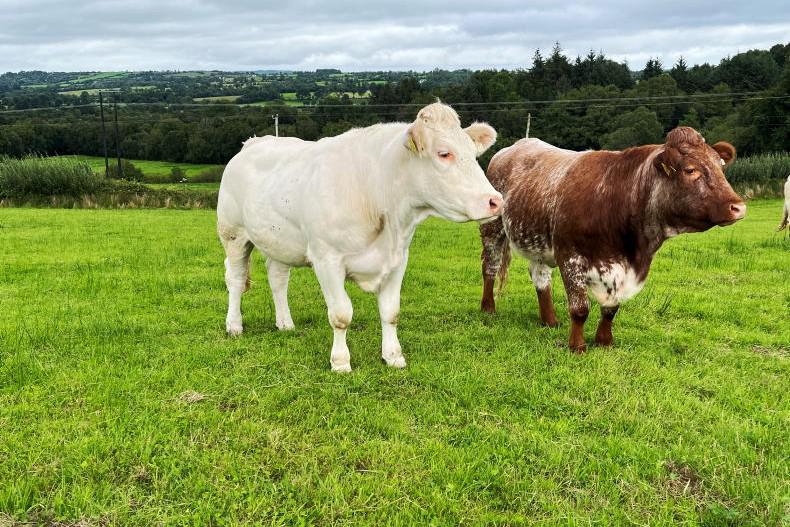

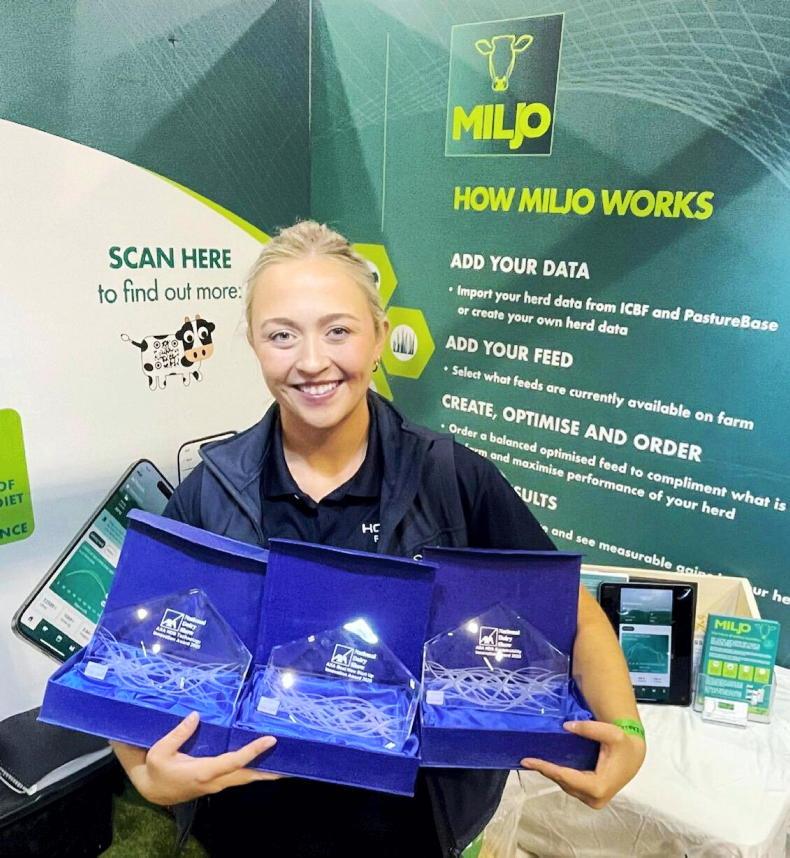
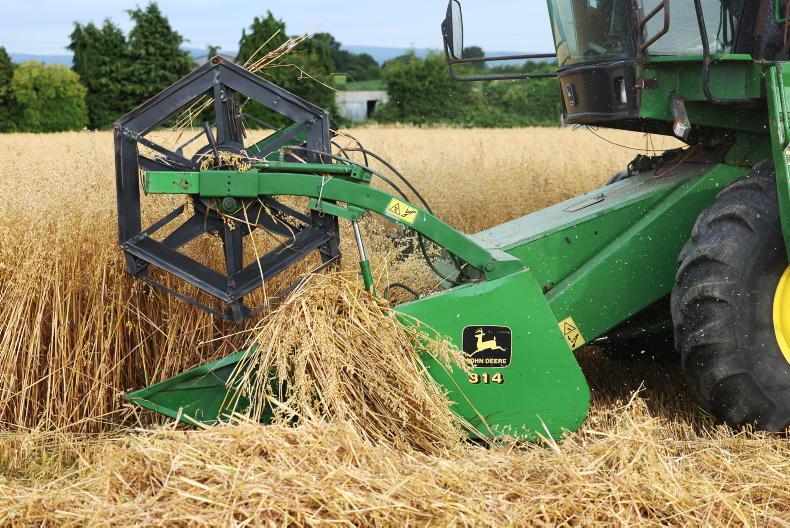
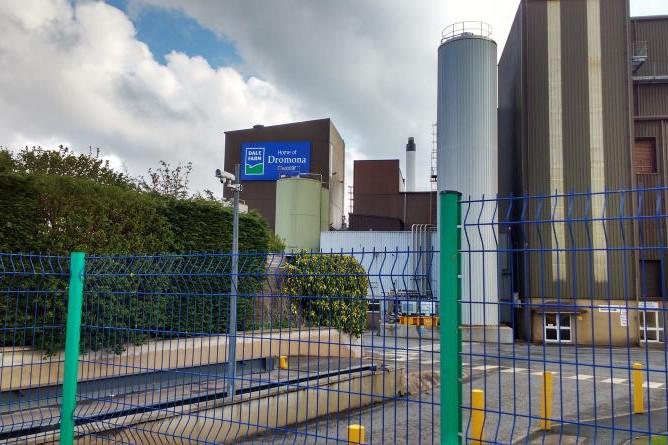
SHARING OPTIONS